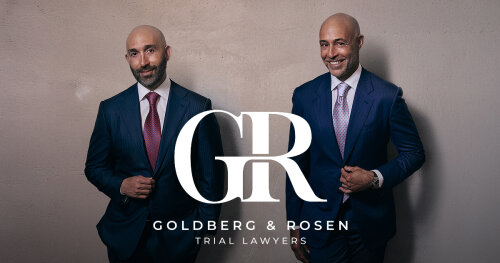Best Consumer Protection Lawyers in Florida
Share your needs with us, get contacted by law firms.
Free. Takes 2 min.
Or refine your search by selecting a city:
List of the best lawyers in Florida, United States
About Consumer Protection Law in Florida, United States
Consumer protection law in Florida exists to safeguard individuals from unfair, deceptive, or fraudulent practices by businesses and service providers. It ensures that consumers are treated fairly when purchasing goods, services, or property, and provides avenues for recourse when businesses violate these rights. The law covers a wide range of issues, including defective products, false advertising, identity theft, unfair debt collection, and warranty disputes. Florida has both state and federal consumer protection laws to help enforce these rights and maintain fair practices in the marketplace.
Why You May Need a Lawyer
Although many consumer issues can be resolved directly with the business involved, some situations are complex or contentious and may require legal assistance. Common scenarios where a lawyer may be helpful include:
- You have been the victim of a scam or fraud
- You are facing harassment from debt collectors
- A business refuses to honor a warranty or guarantee
- You are misled by false or deceptive advertising
- Your identity has been stolen or compromised by a company’s negligence
- You have suffered financial losses due to a defective product or service
- A contract has unfair or illegal terms
- You want to take part in a class action against a company
A lawyer can help you understand your rights, negotiate with businesses, represent you in court or mediation, and ensure that you receive any compensation or remedies you deserve.
Local Laws Overview
The primary state law governing consumer protection in Florida is the Florida Deceptive and Unfair Trade Practices Act (FDUTPA). This act makes it illegal for businesses to engage in unfair or deceptive acts in the conduct of commerce. It gives individual consumers the right to file lawsuits for damages and seek injunctions to stop unlawful business practices.
Florida also enforces several other laws relevant to consumer protection, including:
- Florida Lemon Law - protects buyers of new vehicles with recurring defects
- Florida Telemarketing Act - regulates telephone solicitation practices
- Florida Unfair Debt Collection Practices Act - restricts harassing or abusive actions by debt collectors
- Home Solicitation Sales Act - provides protections for purchases made at home or outside regular business locations
- Truth in Lending Act (federal, but enforced in Florida) - ensures clear disclosure of lending terms
Enforcement of these laws is carried out by the Florida Attorney General’s Office, the Florida Department of Agriculture and Consumer Services, and sometimes by local authorities.
Frequently Asked Questions
What is considered a consumer protection issue in Florida?
Consumer protection issues in Florida include false advertising, unfair business practices, scams, fraud, warranty violations, and problems with products or services that do not meet promised standards.
What should I do if I think I have been scammed?
First, gather all related documents and communications. Then, report the scam to the Florida Attorney General’s Office and the Federal Trade Commission. You may also want to consult a consumer protection attorney for guidance on recovering losses.
Can I sue a business under the Florida Deceptive and Unfair Trade Practices Act?
Yes, consumers have the right to file a civil lawsuit under FDUTPA for damages caused by unfair or deceptive practices. If successful, the court may award compensation and sometimes attorney’s fees.
Are there specific protections for car buyers in Florida?
Yes, the Florida Lemon Law protects buyers of new vehicles with recurring and irreparable defects. If your new car qualifies as a "lemon," you may be entitled to a refund or replacement.
Do I have rights regarding unwanted telemarketing calls?
Under the Florida Telemarketing Act and federal laws, you have the right to limit or stop unsolicited telemarketing calls. You can register on the National Do Not Call Registry and report violations to the state.
How can I stop harassment from debt collectors?
Florida law prohibits abusive, deceptive, or unfair debt collection practices. If a collector violates your rights, you can file a complaint with the Florida Attorney General or seek legal advice to pursue damages.
What if a product I purchased is defective?
You may be entitled to a repair, replacement, or refund, especially if the product is under warranty. If the seller refuses to resolve the issue, you may have a right to legal action under state consumer protection laws.
Are contracts with unfair terms enforceable in Florida?
Contracts containing unfair, deceptive, or illegal terms may be unenforceable under Florida law. An attorney can review your contract and advise you on your rights and possible remedies.
Where can I report a business engaging in unfair practices?
You can file a complaint with the Florida Attorney General's Office, the Florida Department of Agriculture and Consumer Services, or the Better Business Bureau.
What are the time limits for taking legal action on consumer protection issues?
Time limits, known as statutes of limitations, vary by the type of issue but are often between two and four years from when the violation occurred. Consult a consumer protection attorney to determine the applicable deadlines for your case.
Additional Resources
- Florida Attorney General’s Office: Handles consumer complaints and enforcement of consumer protection laws
- Florida Department of Agriculture and Consumer Services: Regulates many aspects of consumer protection and accepts complaints
- Federal Trade Commission (FTC): Federal agency that addresses consumer fraud and deceptive practices
- Better Business Bureau (BBB): Provides business reviews and handles consumer complaints
- Legal Aid Societies: Offer free or low-cost legal help for qualifying individuals
- Consumer Financial Protection Bureau (CFPB): Handles complaints related to financial products and services
Next Steps
If you need legal assistance with a consumer protection issue in Florida, consider taking these steps:
- Document all interactions, correspondence, receipts, and evidence related to your complaint
- Attempt to resolve the matter directly with the business, if safe and appropriate
- File a formal complaint with the relevant state agency or authorities
- Consult a qualified consumer protection attorney to evaluate your case and outline your legal options
- Follow through with any recommended legal or administrative action, including filing a lawsuit if necessary
Acting quickly increases your chances of resolving the issue favorably. If you are unsure about your rights or the proper process, legal professionals and local resources are available to help guide you.
Lawzana helps you find the best lawyers and law firms in Florida through a curated and pre-screened list of qualified legal professionals. Our platform offers rankings and detailed profiles of attorneys and law firms, allowing you to compare based on practice areas, including Consumer Protection, experience, and client feedback.
Each profile includes a description of the firm's areas of practice, client reviews, team members and partners, year of establishment, spoken languages, office locations, contact information, social media presence, and any published articles or resources. Most firms on our platform speak English and are experienced in both local and international legal matters.
Get a quote from top-rated law firms in Florida, United States — quickly, securely, and without unnecessary hassle.
Disclaimer:
The information provided on this page is for general informational purposes only and does not constitute legal advice. While we strive to ensure the accuracy and relevance of the content, legal information may change over time, and interpretations of the law can vary. You should always consult with a qualified legal professional for advice specific to your situation.
We disclaim all liability for actions taken or not taken based on the content of this page. If you believe any information is incorrect or outdated, please contact us, and we will review and update it where appropriate.
Browse consumer protection law firms by city in Florida
Refine your search by selecting a city.












